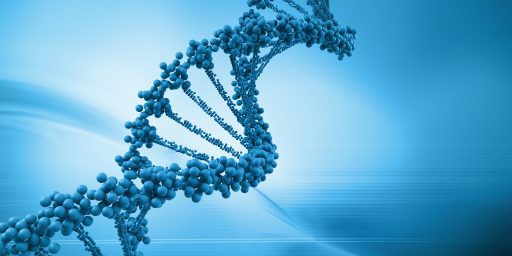Cancer Causes Genetic Changes Years Before Symptoms
A promising new study.

A promising report from The Guardian:
Early signs of cancer can appear years or even decades before diagnosis, according to the most comprehensive investigation to date of the genetic mutations that cause healthy cells to turn malignant.
The findings, based on samples from more than 2,500 tumours and 38 cancer types, reveal a longer-than-expected window of opportunity in which patients could potentially be tested and treated at the earliest stages of the disease.
The work was carried out as part of the Pan-Cancer Analysis of Whole Genomes project, the most comprehensive study of cancer genetics to date.
“What’s extraordinary is how some of the genetic changes appear to have occurred many years before diagnosis, long before any other signs that a cancer may develop, and perhaps even in apparently normal tissue,” said Clemency Jolly, a co-author of the research based at the Francis Crick Institute in London.
“Unlocking these patterns means it should now be possible to develop new diagnostic tests that pick up signs of cancer much earlier,” said Peter Van Loo, co-lead author, also of the Crick Institute. “There is a window of opportunity.”
The discovery that the seeds of cancer are often sown many years before the first symptoms arise will not change cancer screening in the immediate term. But it points to the possibility that those at risk could be spotted far earlier.
The study revealed that about half of the earliest mutations occurred in just nine genes, meaning there is a relatively small pool of common genes that serve as triggers for cells to diverge from healthy development to a path towards cancer. It might be possible, in future, to pick up such mutations using so-called liquid biopsies – genetic tests that detect mutations in free-floating DNA carried in the blood that can indicate the presence of tumours elsewhere in the body.
—“Signs of cancer can appear long before diagnosis, study shows”
While I learned long ago to be skeptical of reports of medical studies in newspapers, this seems like a massive breakthrough. The earlier the cancer is detected, obviously, the earlier it can be treated.






James, do you have a link? I would really like to understand what the study actually says.
While in general adding to our pool of knowledge is always good, cancer precursor markers are a troublesome area. As a researcher colleague told me about a dozen years ago, we all most likely have some cancer cells, all the time. Most of these clusters are tiny and appear to remain dormant. As we become better and better at detecting these cells, interventions will take place earlier and earlier. So what’s the harm? Well, the interventions we have for cancer are pretty drastic and all would be considered an emergency medical conditions on their own if it wasn’t being deployed in a “greater good” attack. We bombard people with radiation. We fill bloodstreams with extremely toxic chemicals. We slice and dice and cut out sections of organs and tissue, and sometimes entire glands and other structures.
The experiment that needs to be conducted in order to know the relative costs of treating otherwise healthy people it is to take a large pool of them and subject them to various radiation and chemo therapies, or slice out organs and tissues and see how they fare over the long run when compared to a control group. This experiment, of course, is completely unethical and will never be done. Until we get to an analog of the entire human physiology, one that allows us to digitally conduct such experiments, we are only marginally better than 13th century physics, with their mercury dosing and leeches.
An example that is playing out in real time: I have had a family member and a co-worker get a preventative face peel in order to ward off melanoma. When I dug down into the papers it turns out that there is a very small net positive benefit in terms of long term cancer survival rates (the only thing that was looked for or measured) for one very specific type of precursor cells. But this type of cell is fairly rare and all of the other precursor cells show no benefit. At least in the case of my family member, the affected precursor was definitely was not present. I suspect the same is true of my coworker, because dermatologists have brought into this in a big way. They smear some gunk on you, a few patches glow on your face, and they recommend the peel, which is an in office procedure. This involves applying a chemical that literally burns the outer layer of skin from your entire face, a painful procedure that takes weeks to recover from. As far as I’ve been able to find, no one has done a long term longitudinal study on adverse outcomes form dosing with this chemical.
While this is indeed very promising, I worry that it will have the same practical difficulty that many other diagnostic approaches have — namely, a very high false positive rate. The key question is “what fraction of people who exhibit these genetic changes eventually develop cancer?”. If the answer is near 100%, you’ve got a fantastic breakthrough. If the answer is less than 1%, you’ve got something less useful than those mail-in colon cancer screening kits.
@MarkedMan:
Article from the Guardian:
https://www.theguardian.com/science/2020/feb/05/signs-of-cancer-can-appear-long-before-diagnosis-study-shows
Paper in Nature (not firewalled):
https://www.nature.com/articles/s41586-019-1907-7
@MarkedMan:
@DrDaveT:
If the genetic markers indicate that a cancer is possible-likely-a sure thing, how can said cancer be treated before it exists? We know that a wide variety of ailments are related to genetic factors and show up generation after generation. Some like Huntington’s Disease can’t be cured but the symptoms mitigated, others like some cancers and heart diseases there is evidence that certain life styles will reduce the potential, but the vast majority of individuals who have long family histories of certain diseases end up with then anyway, despite lifestyle and absence of early indicators.
@MarkedMan:
Yes, this is what I have read too. IIRC, there are also examples of cancer cells being effectively addressed by the immune system, so with this process of earlier identification, there is the potential to treat when it’s not necessary–which, when you consider the side effects of cancer treatments, is no small thing. The book “An Elegant Defense” goes into some of this research.
I agree that this is very interesting data and also agree that it is a long way from practical implementation. Currently there are a few instances where genetic information is used to recommend actual treatments and surveillance; examples would the breast cancer genes and the colon polyps syndromes. The information that this article adds might be hard to turn into action. The most consistent finding in this article was chromosome 7 driving the development of glioblastoma. Glioblastomas are dread tumors, but what actions are warranted in one has the gene abnormality? The breast cancer gene can lead to prophylactic mastectomy, but prophylactic brain surgery seems unlikely. Gene repair technologies such as CRISPR are being worked on. Let’s hope that repair of defects is developed as fast as diagnosis.
BTW, prudent lifestyle choices are probably still more useful than all the high tech on earth to prevent many cancers. We should also be hailing the great decreases in HPV infections due to vaccination.
Guess which states have the lowest rates of vaccination on that.
@MarkedMan:
The article (see the links provided by @mattbernius) explains that they are not up to even getting imaging of exactly where the cancer is — something about free floating DNA in the bloodstream. At best, it could be used to identify people for earlier traditional screening, or clear people from more invasive screenings.
I’m curious as to how well it works for people who are in remission, and whether the mutation levels in the free floating DNA ever go back to normal in the people who will have their cancer return. The next question there would be whether an additional round of chemo would have a beneficial effect, and that seems more ethical.
In the U.S., this will simply be another way for insurance companies to mark people with scarlet “P’s” and refuse to insure them, insure them only at exorbitant rates (several thousand dollars a month), or “insure” them but exclude cancer treatment.
BTW, prudent lifestyle choices are probably still more useful than all the high tech on earth to prevent many cancers.
~70% of cancers have no known etiology. I was one of those. I had no family history, no BRCA mutation, no other risk factors (no smoking, no drinking, no drugs). I got a scarlet P branded on me for life right after completing four half marathons in a month. Meanwhile, my morbidly obese aunt just turned 76 and has never had cancer. My birthfather is a smoker and a drunk, also in his mid-70s and no cancer. My birthmother had cancer, but it was cervical cancer, caused by a virus. My family history is full of people who smoked, drank, drugged, stuffed their faces with bad food for decades, and never exercised but never developed cancer, in most cases living into their 70s and 80s (unless the drinking brought them down).
Yeah, that’s equitable. I’m glad I never had kids. These defective genes die with me.
I don’t have the cite for that stat, and I don’t have time to look for it. I have to work.
@Sleeping Dog: Work to do today and so haven’t yet read the paper, but your question is such an interesting one I’ve gotta give it a go.
We talk about cancers of all different kinds but the definition of cancer is simply cells that are growing uncontrollably. Normal cells hang around until they die and then another cell replaces them. Cancerous cells continue to divide taking up more and more of the surrounding tissue/organ until there is nothing else left. They also a not usually (ever?) effective at their original functions, so if you have liver cancer eventually you have no functioning liver cells left and instead just a blob of cells living off your blood supply. The clumps of these cancerous cells are called tumors. And a cancer is considered metastasized when these tumors are not limited to one location.
In the simplest understanding of cancer once you have a single cancer cell it will divide and grow until it is big enough to kill you. Cancer treatment consists of cutting it out or poisoning it with radiation or chemicals. The trick is to conduct this treatment as much as possible to the tumor and not the surrounding tissue. In the case of cutting, this means not leaving any cells behind and in the case of poisoning, this means deploying enough poison to kill the cancer cells faster than they are dividing until there are none left. In this simple understanding once you find a cancer you should go after it because it will lead to inevitable death.
As our imaging technology has grown so has our understanding of cancers behavior. In the past, by the time you found a tumor it was so big that it was likely to be completely out of control. Today, we know that there are small cancerous tumors that for some reason are not exhibiting this uncontrolled growth. (Why do we call them cancers then? Because when we remove some of the cells and culture them in a dish, they do grow uncontrollably.) So something is going on in the body. Either our immune system is attacking these cells as they grow, killing just about exactly as many as are growing, or there is something that has holding their growth in standby mode. Prostate cancer is a good example of this. Probably the majority of people with prostrate cancer would die before the cancer would kill them, even if they lived 20 or 30 years after diagnosis. Maybe the vast majority. In any case there are some researchers that believe virtually every person over a certain age has at least of a few of these small dormant tumors.
So back to your question. You can treat someone with a marker for cancer before it exists by removing something that is deemed likely to become cancerous (breast, prostate, etc). Or you can discover those dormant tumors and attack them with surgery or poisons. The concern in either case is that the side effects can be very severe (ex: life long pain, erectile dysfunction and incontinence in a fair number of prostate surgery patients).
@MarkedMan: Among the perils of blogging before 5 am, apparently, is that one forgets to link the damn source. (Corrected) And you make some good points about false positives and hyper-aggressive treatment. I’ve long been leery of preemptive strikes such as mastectomies based solely on family history.
As a Doctor friend of mine said 50 years ago….”we will never “cure” cancer. Why? Think about what cancer is. Cells which divide uncontrollably. We snip it, radiate or chemo it, but we can’t cure it. Because to cure cancer means we know how to stop a cell from dividing and if we figure how to stop a cell from growing that means we will know how to START cells to grow and if we figure out how to stop and start cellular growth…..well, we become GOD. Man will be immortal. Hence, we will never “cure” cancer, only treat it.’
I remember than conversation as if it were yesterday…..and 50 years later we still haven’t cured cancer…and maybe it has to do with understanding the secret to life itself which is beyond human comprehension perhaps.
@the Q: I’ve started cellular growth. Twice. Of course, I needed my wife’s help to do it….